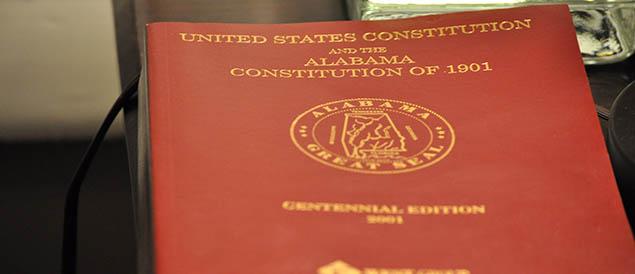Amend this! Bloated Alabama Constitution gets bloatier

890 AND COUNTING: Alabama’s curious amendment process has greatly contributed to its status as the longest governing code in the world.
By Johnny Kampis | Watchdog.org
CULLMAN, Ala. — The results of the 2014 general election mean an Alabama Constitution ready to bust out of its binding grows even larger.
That’s because the five amendments up for consideration on the ballot all passed Tuesday. Those will be added to the 885 amendments already tacked onto the 1901 document.
This isn’t some pamphlet we’re talking about. The Alabama Constitution — the wordiest in not only the nation, but also the world — is now more than 340,000 words long. That’s 12 times larger than the average state constitution and 40 times longer than the U.S. Constitution.
The New Testament? Pffft. It’s half the size of the Yellowhammer State’s governing code.
Alabama’s most celebrated literary export, “To Kill a Mockingbird,” clocks in at under 100,000 words. Which would you rather read?
The merits of those amendments voters approved Tuesday could certainly be debated. Amendment 3, for example, provided “that every citizen has a fundamental right to bear arms and that any restriction on this right would be subject to strict scrutiny.”
Doesn’t the Second Amendment to the U.S. Constitution cover this? Not in such strong language apparently.
Rep. Mike Jones, R-Andalusia, said he copied a similar measure passed in Louisiana in 2012 after it was discovered that state’s judges only needed a “rational basis,” the lowest level of judicial review, to restrict gun rights there.
“I’m not big on re-inventing the wheel,” he told AL.com, “but I believe we need great clarity in people’s fundamental right to bear arms.”
However, Nancy Ekberg, spokeswoman for Alabama Citizens for Constitutional Reform, said amendments like that one and Amendment 5, which clarified Alabama residents’ right to hunt and fish subject to reasonable regulations, seem unnecessary.
“We already have the right to hunt and fish in Alabama, and it’s one of our major industries,” she said. “We already have the right to bear arms guaranteed by our state and national constitutions.
“They did seem to be redundant,” Ekberg added.
It probably doesn’t help when amendments are written in legalese, hardly understood by anyone without a law degree. Read them here.
Amendment 4 requires a two-thirds majority vote in the Alabama Legislature to pass any general law that would impose an unfunded mandate of over $50,000 on local boards of education. Note that the word “Legislature” appears nowhere in the language of that amendment.
A voter at the Cullman Civic Center told Alabama Watchdog on Tuesday she voted “yes” on all of the amendments.
“I couldn’t understand them,” she said, “but I voted yes because I figured they wouldn’t put them on there if they didn’t want us to.”
Alabama Citizens for Constitutional Reform is most concerned with the current requirement that even issues of only local consequence — say, the pay of the Greene County probate judge or beaver trapping fees in Fayette County — must be voted on statewide. About three-quarters of the constitution’s amendments apply to only a single city or county, and amendments make up 90 percent of the document’s length.
“We should let our counties run their own business,” Ekberg told Watchdog.
The group seeks legislative support to allow residents to rewrite the constitution and condense all those amendments into more streamlined statute, but it has been a decades-long battle without result.
The GOP made rewriting the constitution a priority when it won control of the Legislature in 2010, but rather than seek a constitutional convention Republican leadership created a commission to recommend revisions of a few articles each year.
The Alabama Supreme Court is divided about whether that plan is constitutional, with Chief Justice Roy Moore and Justice Tom Parker sending advisory opinions to lawmakers in March that the article-by-article approach may not be allowed.







